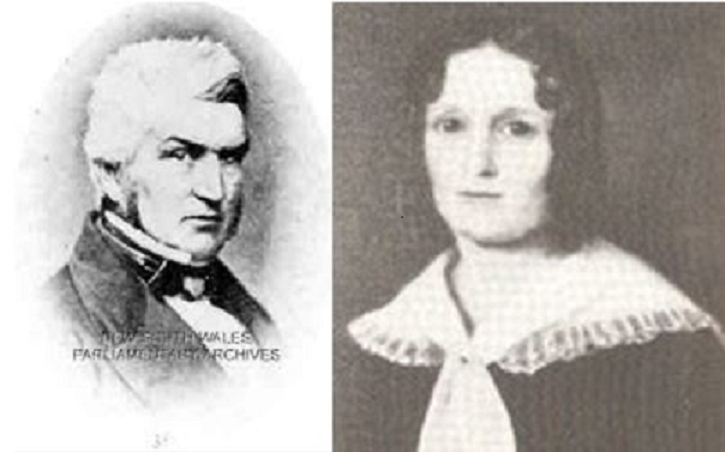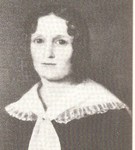
George Oakes (1813-1881) and Mary Ann Oakes (1810-1865) & Mary Anne Oakes (1825-1877)
George Oakes was born on 8 August 1813 at Parramatta. He was a pastoralist and politician. He was fourth child and eldest son of Francis and Rebecca. Educated by Rev. John Eyre and at Rev. Frederick Wilkinson's school, he early followed pastoral and agricultural pursuits and bought land within the nineteen counties in the 1840s with his brother Francis as partner. He lived near Goulburn for a time but made his headquarters at Parramatta. he became a member of the District Council in 1842 and was active in getting a water supply for the town. He was on the committees of the local Benevolent Asylum and District Hospital.
George married Mary Ann, daughter of Rev. William Shelley, whom he had married at St John's Church of England, Parramatta, on 25 May 1837. They had two sons:
- Charles Shelley Oakes ( 7 August 1838 to 9 April 1873)
- George Francis Oakes (1840 to 30 January 1857)
Mary Ann Oakes, born in Parramatta on 12 December 1810 and died due to dysentery on 17 November 1865. Her funeral was on 24 November 1865 (1810-1865).

Death Notive of Mary Ann Oakes Sydney morning Herald, 17 December 1865, p1

Funeral of Mrs Mary Ann Oakes, 24 December 1865, p5
George married his second wife Mary Anne Morrison, a widow in Hobart Town on 30 April 1867.

Mary Anne Oakes (Morison) – 1825 to 16 November 1877 (Source: Geni)
George was a member of the Anti-transportation League, Oakes defeated William Macarthur in a bitter fight to represent Parramatta in the Legislative Council in 1848. The Empire, 5 September 1851, applauded the re-election of this 'earnest advocate for popular rights' who had not 'suffered himself to be wheedled or bounced out of the independent exercise of his own judgment', but warned him 'to turn his eyes from the pageantries of Government House'. In 1856-60 he represented Parramatta in the Legislative Assembly and supported the Cowper-Robertson faction. Defeated in 1860, he was appointed to the Legislative Council on 10 May 1861 to carry the land bills but was not sworn in as the president, Sir William Burton, walked out. In June he 'absolutely' declined appointment to the reconstructed council as he could not accept the ministry's conditions of voting for an elective council and for the land bills.
After his defeat in 1860, George visited Europe for some years and became a regular 'habitué of the House of Commons'.
George was a life member of the British and Foreign Bible Society. He affirmed his Protestantism but deplored the mixing of religion and politics. In 1872 he won a by-election for East Sydney. One of the 'most embittered opponents' of (Sir) Henry Parkes's government, he did not identify himself with the Opposition; without political friends he saw himself as head of a new 'party'. Henry thought George a 'sneak' who was 'forever pretending to be the friend of somebody of men, while … secretly endeavoring to discredit them'. In the 1870s George was a director of the Australian Gaslight Co. and a councillor of the Agricultural Society of New South Wales. When in Sydney he lived at the Reform Club in Macquarie Street. He visited England again and was a New South Wales representative commissioner at the 1876 Paris and Philadelphia Exhibitions. On his return in 1879 he was appointed to the Legislative Council. In 1880 he was a commissioner for the Melbourne Exhibition.
George continued to prosper. He had a house in Parramatta, an orangery with 2500 trees and an 'estate', Oak Park to name a few.
On 10 August 1881 after leaving Parliament House Oakes was run over by a steam-tram and died in the Sydney Infirmary. He was buried in the Wesleyan section of the Parramatta cemetery. He was survived by his mother, reputedly the second child born in the colony, and by a son of his first wife Mary Ann, daughter of Rev. William Shelley, whom he had married at St John's Church of England, Parramatta, on 25 May 1837. He was predeceased by his second wife Mary Anne Morrison, a widow whom he had married in Hobart Town on 30 April 1867. His goods were valued for probate at almost £50,000.

Death of George Oakes: Sydney morning Herald, 11 August 1881, p5
It read as:
DEATH OF THE HON. GEORGE OAKES M.L.C.
We regret to have to chronicle the fact that the Hon. George Oakes, M.L.C., one of the best known and most respected of our colonists, met with an accident last evening, on the Elizabeth-street tramway, which terminated in his death. The hon. gentleman had been attending to his Parliamentary duties, and left the Legislative Council Chamber about 6 o'clock, intending to take a tram to Redfern, and thence proceed by train to Parramatta. After he arrived at the tramway office in Elizabeth-street a tram from Waverley passed in the direction of Hunter-street. This tram was followed at a short distance by another which had also arrived from Waverley. Both trams had stopped at the comer of Elizabeth and King streets to allow passengers to alight, and then continued their journey. Mr Oakes seems to have been unaware of the fact that two trams were so close to the terminus. When the first had passed the office he stepped on to the up-line and looked towards Hunter street in order to see whether the Redfern tram was approaching. As a matter of fact such tram had started, and had got as far as Wentworth Court. Immediately Mr Oakes stepped between the rails, the second tram from Waverley, which it was stated was travelling at the rate of about two miles an hour, came upon him. The people who were standing about shouted to him, and the fireman of the motor pushed him off the line. Mr Oakes fell with great force upon the asphalt road and fractured the base of his skull. There was considerable hemorrhage from the wound. It would seem that when the fireman pushed Mr Oakes off the line, one of the feet of the latter tripped, for, after he was picked up, it was found that the heel of one of his boots had been crushed, and the boot stripped from the foot. This is supposed to have been occasioned by the near forewheel of the motor coming in contact with the foot, which must at the time have been fixed in the groove of one of the rails. Mr Oakes was picked up by the conductor of the second Waverley tram and was sensible for a short time, during which he requested the conductor to put his boot on. A stretcher was obtained and the unfortunate gentleman was removed to the Infirmary, where he was admitted by Dr Baly. Mr Oakes was then quite unconscious, blood was flowing from his left ear, and he was breathing stertorously. It was at once seen that he would not have very long. The sufferer was removed to a ward, where he was attended by Drs Williamson, Moffit, and Baly, the resident medical officers, and Drs Morgan and Tarrant, honorary medical officers of the institution. Mr Oakes gradually got weaker, and death took place at a few minutes to 8 o'clock. Deceased was a son of the late Mr Francis Oakes. He was a native of Parramatta and an old colonist, being at the time of his death sixty-seven years of age. He was a large landed proprietor, and was extensively associated with pastoral pursuits. He entered upon political life in August, 1848, upon which occasion he was elected a representative of Parramatta in the old Council. On the 29th of March, 1856, he was returned to the Legislative Assembly for the same constituency, and remained a member of the first Parliament until it was dissolved in the following year. He was re-elected in June, 1858, and remained in the second Parliament until that was dissolved and he also held a seat in the Assembly during the third Parliament. Later on he was returned a representative of East Sydney, in the room of Mr. Saul Samuel, who went into the Council to represent the Government, and he remained a member of the seventh Parliament until it ceased to exist. In 1861, during the agitation on the Land Bill, he was appointed to the Legislative Council, but did not sit there then, the President refusing to cause him and several other nominees to be sworn in because the Government had not consulted him in reference to their nominations. In October, 1879, however, shortly after returning from Europe, he was nominated for the Council by Sir Henry Parkes, and sat there until his death. He came from Parramatta yesterday in company with Mr. Fitzpatrick, M.L.A., and after engaging in some business in the city, lunched at his club. In the afternoon he proceeded to the Council to hear Mr. W. B. Dalley's address against the passing of the Chinese Restriction Bill. He left the Chamber when that gentleman had finished speaking, which was about 6 o'clock, and, as already stated, he met with his death while endeavouring to return home. Mr. Oakes, for some time prior to his death, was a widower. He has left a son behind him – Dr. Oakes of this city.
Sydney Morning Herald, 11 August 1881, p 5
![]()
Neera Sahni, Research Services Leader, Parramatta Heritage Centre, City of Parramatta 2021
Reference:
- National Archives of Australia - http://www.naa.gov.au/ retrieved on 26/03/2021
- National Library of Australia Trove Digitised Newspapers Database – Death of Hon George Oakes, MLC retrieved on 26/03/2021
- National Library of Australia Trove Digitised Newspapers Database - Pioneers Missionaries Francis and Rebecca Oakes Memorial Tablet Unveiled retrieved on 26/03/2021
- National Library of Australia Trove Digitised Newspapers Database - Parramatta retrieved on 27/03/2021
- Gunson,N (1967) 'Oakes, Francis (1770–1844)', Australian Dictionary of Biography, National Centre of Biography, Australian National University. http://adb.anu.edu.au/biography/oakes-francis-2513/text3397 retrieved on 30/03/2021
- NSW Environment and Heritage - http://www.environment.nsw.gov.au/Heritage/research/rumtrack.htm retrieved on 26/03/2021
- State Library of NSW - http://www.sl.nsw.gov.au/ retrieved on 31/03/2021
- NSW State Archives and Records. Colonial Secretary’s Papers. Colonial Secretary Index, 1788-1825. Oadham to Oatley and Parramatta, Female Factory. Viewed at https://www.records.nsw.gov.au/node/1696#o retrieved on 26/03/2021George Oakes (1813-1881) and Mary Ann Oakes (1810-1865) & Mary Anne Oakes (1825-1877)


